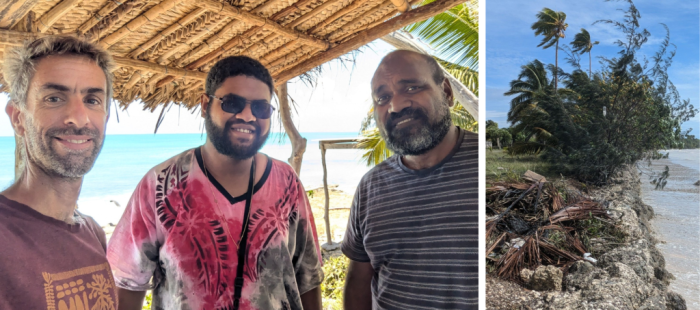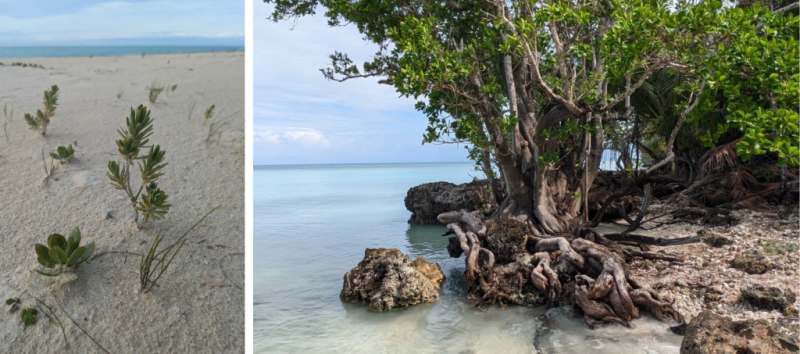
Ouvéa, Loyalty Islands – As climate change accelerates and coastal erosion threatens Pacific Island shorelines, Ouvéa one of the Loyalty Islands in New Caledonia’s archipelago, is pioneering an effective, ecosystem-based adaptation (EbA). Through local leadership and community action, Ouvéa is showcasing how Nature-based Solutions (NbS) can strengthen climate resilience while preserving the island’s natural beauty.
Rising sea levels have disrupted the historical balance of sand movement on the beaches of Ouvéa. Natural sand replenishment, once reliable after cyclone seasons, is no longer guaranteed. Contributing to the problem are human activities like poor rainwater management along the roadside, sand and shell collection, brush clearing, and fires that strip away protective vegetation.
“What may seem like simple habits such as clearing brush or collecting shells, can weaken the coastline’s natural defences. But the solutions are just as simple and rooted in nature,” says Francois Tron, Pacific Ecosystem-based Adaptation to Climate Change (PEBACC+) Project Coordinator.
“The actions taken by Ouvéa, from protecting pioneer vegetation to improving rainwater management, show that real progress doesn't always require high-cost infrastructure. Often, it means listening to nature, working with it rather than against it, and supporting communities in reclaiming and updating the stewardship they’ve always had over their environment."
Mr. Tron added, "The PEBACC+ project is supporting these efforts, and we believe that what’s happening in Ouvéa can inspire similar initiatives across the Pacific region and beyond. By investing in nature, we are investing in long-term resilience for people and ecosystems.”

Local efforts to mitigate coastal erosion include the Paradis d'Ouvéa hotel implementing protective measures such as stopping the removal of pioneer vegetation and banning fires on the beach. These actions have made a tangible difference; among all the sites in Ouvéa surveyed recently, this location showed the least evidence of significant shoreline erosion.
Pierre Kaouma, a tourism business owner in Ouvéa, said, “Observe and analyse carefully before speaking. Too often, well-intentioned interventions are rushed, overlooking the subtle but critical ways that ecosystem functions. Observation allows communities to understand the natural rhythms of sand washed off and back from the coastline, the behaviour of stormwater, the quiet role of pioneer plants, and the lasting wisdom embedded in traditional practices.”
Native species such as Ironwood, Chicken Foot, Wild Tobacco, and the White Mangrove play a critical role in stabilizing the shoreline. Their branches dissipate wave energy and retain sediments on the upper beach, while their root systems hold sand and stones in place, even during violent storms.
Mr. Tron said that simple actions like bundling coconut fronds instead of burning them, avoiding unnecessary clearing with fire, blade or lawn mowers, and supporting regenerative hydrology can significantly reduce erosion and protect the coastline at low cost.
Mr. Karyl Treniwa, Ouvéa Municipality council member in charge of environment commission said, "As a community deeply connected to our land and sea, we in Ouvéa understand that protecting our coastlines is not only about preserving our environment but also our culture, livelihoods, and way of life.”
“At the municipal level, we are proud to facilitate Kiwa PEBACC+ investment and to support project implementation that reflect both scientific and traditional knowledge, within a regional collaborative setting. What is happening in Ouvéa proves that local communities can lead the way in climate resilience when they are empowered and supported."
As a call to action, Ouvéa’s experience shows that climate resilience begins with listening to nature, respecting traditional knowledge, and acting locally. We invite policymakers to embed NbS into climate adaptation strategies. We encourage coastal communities to reclaim their role as stewards of the land and sea, drawing from both ancestral wisdom and modern science.

The PEBACC+ Project is partnering with the Municipality of Ouvéa, Loyalty Islands Province, Iaai Customary Council, New Caledonia Government and local civil society organisations, promoting nature-based solutions to protect vulnerable ecosystems, communities, and local economies. It is implemented by the Secretariat of the Pacific Regional Environment Programme (SPREP) and funded by the Kiwa Initiative through its donors, the European Union, Agence Française de Développement, Global Affairs Canada, Australian Government Department of Foreign Affairs and Trade and New Zealand Ministry of Foreign Affairs and Trade, with co-financing from the French Facility for Global Environment.
PEBACC+ is a regional project that seeks to strengthen the resilience of ecosystems, economies, and communities to the impacts of climate change in Fiji, New Caledonia, Wallis and Futuna, Solomon Islands and Vanuatu. The project will develop, sustain, and institutionalise Ecosystem-based Adaptation to climate change in these five countries and territories.
For more information, contact:
François Tron, PEBACC+ Coordinator, SPREP; email: [email protected];
Setaita Tavanabola, PEBACC+ Communications Officer, SPREP; email: [email protected];